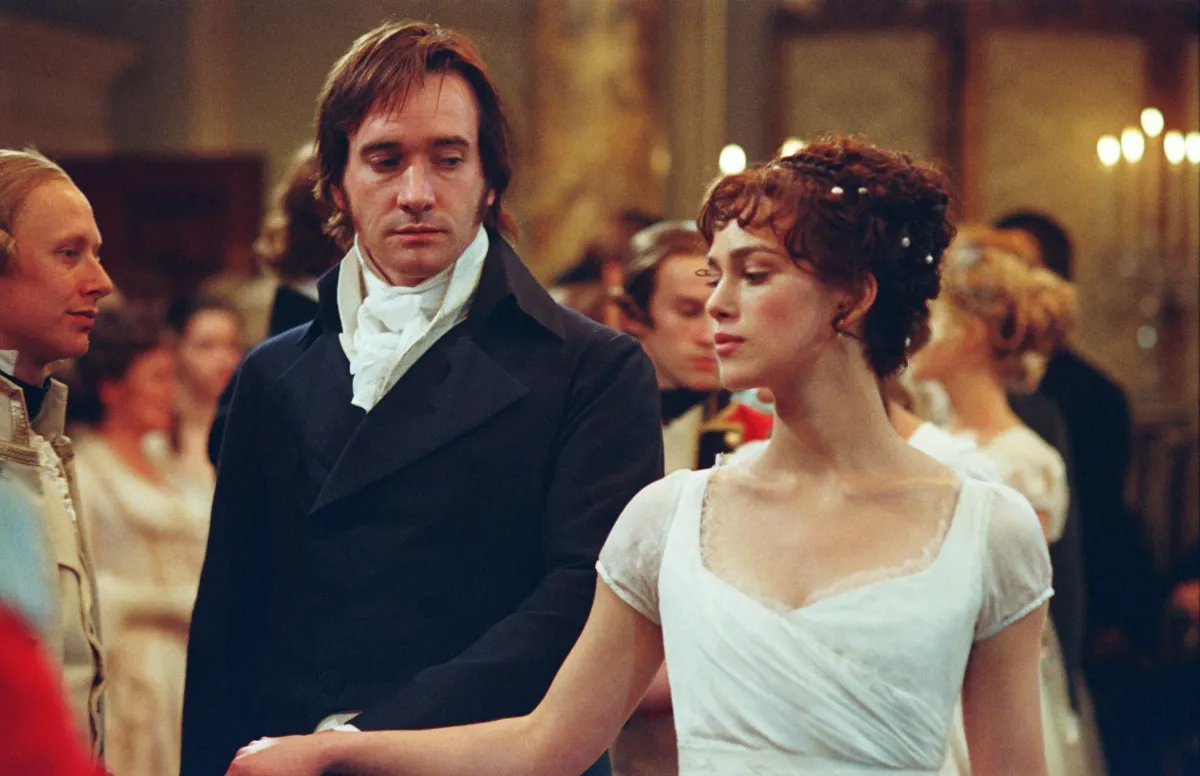
In the 21st century, it’s only natural that we yearn for simpler times. We wish to understand what it was like to live in a world absent of phones and television, when communication isn't a high-speed endeavor and where our socio-economic climate isn't rapidly evolving and changing. We are more than ever incapable of appreciating the small, insignificant joys and triumphs one can experience in life, and in order to feel those joys as people once did, we must step into the past. Marking the film's 20th anniversary, Joe Wright's Pride and Prejudice (2005) will be re-released in theatres on April 20th, and the anniversary couldn’t come at a more pinnacle time.
The incredibly successful Jane Austen adaptation is what I would confidently call the greatest romance film of all time, not only because the movie itself is spectacular, but because of how many people seem to agree with this take. For those who aren’t familiar with Pride and Prejudice (and I would like to encourage all of those who aren't to stop reading and immediately buy a ticket for the re-release), the film follows the Bennet family living in England during the 19th century. The Bennets children are comprised of five daughters at a time when women faced the extreme limitation of their rights, and we watch as the family struggles to navigate the complexities of courtship and love. This was a necessary, and perhaps the sole battle they faced, as the overwhelming pressure of marriage was the only chance for the girls to live happy, fulfilling lives.
The film's two-hour run time inaugurates us into the slow pace of the Bennet family's bucolic, landed lifestyle, but the pace quickens almost immediately. We follow Elizabeth Bennet, (Keira Knightley) and her tumultuous dynamic with the wealthy bachelor Fitzwilliam Darcy Esquire (Matthew Macfayden). Elizabeth’s older sister Jane (Rosamund Pike) finds a connection with Mr. Bingly (Simon Woods), another wealthy heir, and Mr. Darcy’s best friend, and their connection is continuously tested and opposed. There’s the youngest sister, Lydia (Jenna Malone), who runs off with a soldier, Mr. Wickham (Rupert Friend), who previously expressed an interest in Elizabeth and coincidentally has a fraught past with Mr Darcy. The family matriarch, Mrs. Bennet (Brenda Blethyn), is an intemperate, often off-putting figure whose insistence on her daughter's success in marriage continuously backfires. Mr. Collins (Tom Hollander), a distant cousin of the father, Mr. Bennet (Donald Sutherland), stands as the only heir to the Bennet estate unless the daughters marry. This obnoxious, awkward little man is interested in a partnership with one of the daughters. Due to all these separate factors, not to mention the long and restless progression of events between Elizabeth and Mr. Darcy, the film puts forth a mastery of pace and tension building. Each little interaction and passing of time only heightens this tension, which builds and builds and is released in the most satisfying, worthwhile of ways, with an ending that is so picturesque and perfect that you wish the movie would continue forever, just to watch as the characters live their lives.
There is something so stunning about the contrast that Pride and Prejudice paints in lieu of our modern world, and it's why I repeatedly return to the film. I must've seen it 50 times by now, and it never gets old. When the interaction between the sexes is so intensely monitored, discrete small gestures (a fleeting glance or touch) are all that one can use to show affection. When a simple clenching of the hand depicts Mr. Darcy's undeniable attraction towards Elizabeth, viewers wish to see these small details in their own lives, even if they are not there. The film forces us to slow down, embrace patience as the virtue it is, and not rush all the time. Despite the world moving at light speed, it does not mean we have to as well. Pride and Prejudice truly brings us to a different time in that we appreciate so many factors of the slower life that was lived but also see the progress we are able to enjoy and live within now.
Many of the conflicts that arise in Pride and Prejudice are due to the airtight expectations of women and romance in the Regency era. The only way for a woman to have a life, not be a pauper or a burden upon her family, was to marry, and hopefully, that marriage would be prosperous and beneficial. If the Bennets weren't considered “poor”, even though their home and staff display something different to us today, Jane would've had no problems in her courtship with Mr. Bingley. If Mr. Collins wasn't the sole heir of the land, then the incentive to marry, to be able to keep what little the daughters are capable of holding, would not have been so great, and maybe for Elizabeth, it wouldn't have existed at all. What viewers love and revel in when watching Pride and Prejudice is not that there were happily ever afters for Jane and Elizabeth, but that despite the expectations of society and despite the poor luck and impossibilities of their situations, they were able to achieve these happy endings.
What I see as ironic, given the film’s 20-year anniversary, is that 20 years after the film's release and 212 years after the original novel's release, we watch the movie and enjoy how different it is to our society now, and yet, in the same year that the movie is available again in theatres, we are actually seeing a cultural regression. While it is a smaller, unsuspecting thing, and not one that would return us exactly back to the limitations of the 1700s, it implies the beginning of a regression that seems to embody all that has been improved and built upon since that period.
The SAVE Act (H.R.22), a legislative bill that, if passed, would greatly impact U.S. citizen's ability to vote, could actually affect the ability of married women to vote in the U.S. To read more about the specifics of the bill, read more about it here. While the bill isn’t designed to infringe upon women's rights directly, it indirectly raises difficulties, forcing married women to jump through additional hoops to be eligible to vote. If a woman's legal last name does not reflect the name inscribed on their birth certificate, they simply won't be allowed to vote, unless all their documents reflect the same surname. This isn't some outdated sentiment similar to what we see in Pride and Prejudice, where women won't be allowed to vote or are defined in their personhood by their existence as a daughter or a wife. Still, it inadvertently perpetuates the idea that women are not defined by their existence as individuals but by their gender. While this does not seem proposed with blatant ill-intent directed towards women and is more an attempt to negatively impact other marginalized communities of the U.S, it is a glaring red flag, one that should bring attention to the progress that has been made given gender equality and equality in general, and that it cannot be lost.
This post is for subscribers only
Subscribe now and have access to all our stories, enjoy exclusive content and stay up to date with constant updates.
Already a member? Sign in
